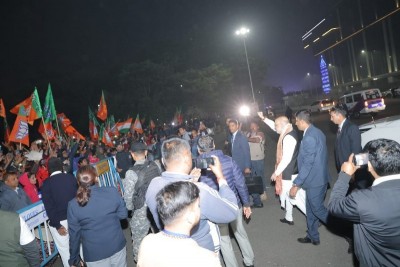-1452264356.jpg)
Framers of the country's Constitution rightly adopted parliamentary democracy: Jaitley
"Surviving as democracy with large chunk of the population under poverty has been remarkable”, he added.
Jaitley was delivering the 2nd ALSOC(Alumnorum Societas) Distinguished Lecture on “Future of Parliamentary Democracy in India” at St. Xaviers College, here.
He expressed confidence that Indian parliamentary democracy would not face any external threat like in other neighbouring countries.
However, Jaitley observed that our parliamentary democracy is under little bit of strain and there is a need for self-correction after introspection.
He identified five challenges that need to be addressed to make Indian parliamentary democracy more vibrant. These include the need on the part of politicians who exercise power to improve their conduct, quality of debate and language they use on various platforms.
He expressed hope that public opinion will help them in this endeavour. The second challenge is the emergence of new political parties which are individual centric and linked with caste and communities where succession is through family which may lead to a large part of our democracy becoming dynastic in nature. The third challenge is the need to reach out to the tribals who have not benefited from development ushered in under democracy and hence are resorting to violence and indoctrination into Maoist philosophy.
He expressed apprehension that otherwise this disparity in economic development may lead to destabilisation of the system.
The Minister identified the current trend of democracy where debates are becoming noisy and shrill and parliament sessions are disrupted repeatedly, as the fourth challenge.
Jaitley underlined the urgent need to address the system of upper House blocking the legislation passed by the Lower House in parliament, as a result of disruptions or just for the sake of preventing legislating activity.
He called for change in the role of two Houses in a bicameral legislature based on Doctrine of Mandate and Doctrine of Manifesto.
Otherwise, he expressed his apprehension that in the foreseeable future governments are unlikely to have majority in the Upper House and legislation may become difficult.
Jaitley identified pre-eminence of institutional privacy as the fifth challenge that may weaken parliament. While expressing concern over the recent judgement of the Supreme Court on the National Judicial Appointments Commission Act, he said that it reflected the distrust about elected representatives of people.
“At the end of the day only politicians are accountable to the people and disregarding an accountable institution is quite damaging to parliamentary democracy”, he added.
Support Our Journalism
We cannot do without you.. your contribution supports unbiased journalism
IBNS is not driven by any ism- not wokeism, not racism, not skewed secularism, not hyper right-wing or left liberal ideals, nor by any hardline religious beliefs or hyper nationalism. We want to serve you good old objective news, as they are. We do not judge or preach. We let people decide for themselves. We only try to present factual and well-sourced news.







